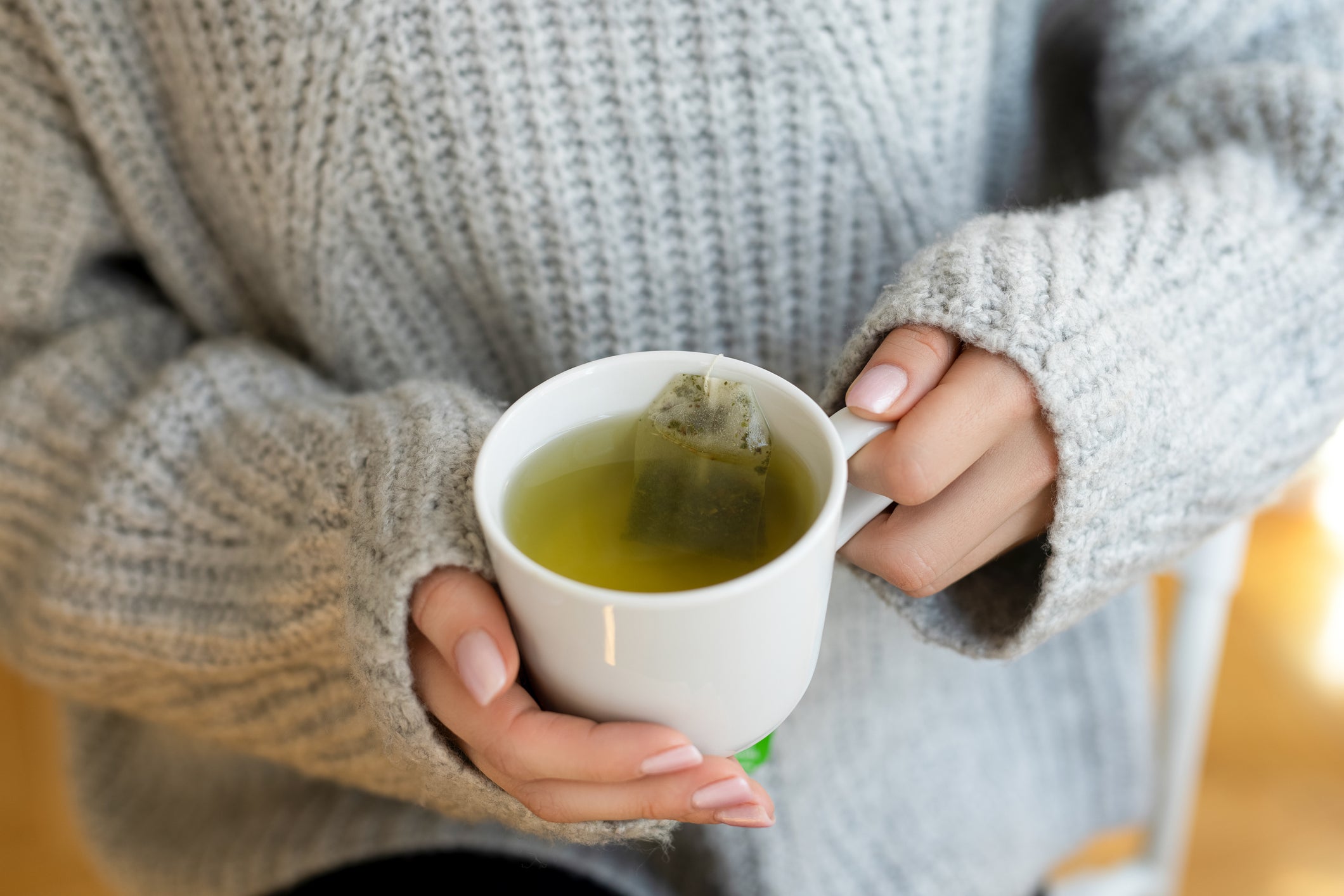Is your tea helping or harming your gut health? Here’s what the experts say
From builder’s brew to saffron infusions, Amira Arasteh sips her way through black, green and herbal teas to uncover which ones truly support your gut, boost your brain and calm inflammation – and which might be doing more harm than good


Fancy a cuppa? It’s the age-old question that sets everything in motion – from work meetings to family gatherings. For many Brits, it’s second nature to reach for the kettle and pop in a trusty earl grey or English breakfast tea bag – milk and one sugar, thanks. However, as more of us begin to consider the impact of our food and drink on gut health, brain function and inflammation, it may be time to ask: is your tea actually benefiting you?
For me, tea has always been part of life. Being Persian by blood and British by birth, multiple cups of tea are a staple custom in both cultures. Typically, this is black tea in both, with tea in Iran even skipping the milk (and leading me to drink it this way in the UK as well).
Saffron tea is also something I get up with – saffron isn’t some luxury spice I reach for once in a blue moon, it’s a staple in the kitchen cupboard. It’s in my rice, it’s in my stews and, more recently, it’s been in my mug.
With growing chatter about the health benefits of daily olive oil shots, it got me wondering: could saffron tea be the next big gut-friendly trend?
So I took a proper look into the world of teas: from the humble builder’s brew to antioxidant-packed green tea; from soothing fresh mint to fragrant turmeric – all in the name of finding out how these different brews affect everything from our brains to our bellies.
Sip on this: the science behind your brew
Black tea
First things first: not all teas are the same. While black and green tea both come from the same plant, camellia sinensis, the way they’re processed makes all the difference. Black tea is fully oxidised, giving it its dark, rich colour and malty flavour, while green tea is steamed or pan-fired to keep those fresh and earthy notes.
But while it’s simply a traditional way to start the day for many of us, did you know that your daily cuppa could be doing more for you than you realise? According to Dr Mohammed Najjar, medical director of Jorja Healthcare group, black tea is also rich in polyphenols, which protect cells from damage.
He says that “some research suggests that there is molecular evidence of health benefits of drinking black tea” and that it may help to lower blood pressure and cholesterol, as well as reduce the risk of heart disease.
The best gut-friendly teas to try...
... and why
- Black tea: Great for brain health and memory, high in polyphenols – but watch your caffeine intake
- Green tea: Antioxidant-rich, supports heart health and metabolism
- Ginger tea: Anti-nausea and digestion-boosting
- Peppermint/fresh mint tea: Soothes IBS-like symptoms and supports digestion
- Turmeric tea: Anti-inflammatory and may help with bloating
- Saffron tea: Gut microbiome booster, mood-lifting and caffeine-free
“Black tea also contains tannins that are beneficial for supporting digestion and soothing gastric problems,” he adds.
Recent research, including findings reported in The Telegraph, also suggests that black tea might play a surprising role in supporting brain health. Scientists have linked regular black tea consumption to improved memory and a reduced risk of dementia. That’s down to the polyphenols, which have anti-inflammatory effects and support healthy blood vessels.
Green tea
Polyphenols in green tea, such as EGCG (epigallocatechin gallate), are even more powerful and have been studied for their role in various health benefits, including cancer prevention and improved heart health.
Regarding green tea, Dr Najjar says: “It is believed that it can support gut health by promoting beneficial bacteria in the gut microbiome and helping to reduce harmful ones.”
He also adds that the polyphenols in it can be metabolised by gut bacteria, aiding their diversity.
In terms of other health benefits, green tea is thought to positively influence metabolism, which can support fat burning. Dr Najjar also shares that some research links drinking green tea to a reduced chance of developing some cancers, as well as the potential to lower the risks of heart disease.
Herbal teas
But beyond black and green, there’s a whole world of herbal teas to explore. Ginger tea, for instance, can calm nausea and help digestion. Peppermint tea relaxes the gut muscles and may ease IBS-like symptoms. Turmeric tea? It’s anti-inflammatory and could help reduce bloating – something to consider the next time you place your order at your local cafe.
“Herbal teas such as peppermint, ginger and chamomile can offer a range of health benefits depending on which one you select,” says Dr Najjar.

He says that chamomile, known for its naturally caffeine-free state and relaxing effects, is not only favoured as a bedtime drink but that research also suggests it can be beneficial in helping to lower the risk of death from heart disease, supporting the immune system and possibly protecting against some cancers.
Dr Najjar adds that “other research suggests it may even help to slow down the bone loss that comes with age”.
As well as reducing digestive issues, peppermint tea is a muscle relaxant, meaning that, in addition to the benefits to the gut, “it’s also believed that it can help to relieve tension headaches and migraines,” shares Dr Najjar.
And then there’s saffron tea – the golden brew that deserves more love. I won’t lie, in Iran, every Persian is accustomed to having a stick of “nabat” (a crystallised saffron sugar stick) dissolved in hot water to alleviate the symptoms of diarrhoea – but this proves how anti-inflammatory and beneficial to the body saffron tea can be.
Saffron has been used for centuries in traditional medicine. It can help diversify gut microbiota (the good bacteria that live in your digestive system), lower blood pressure and ease symptoms of PMS and depression. Additionally, it’s rich in crocin and safranal, compounds that have been shown to enhance both mood and memory. If you’re looking to indulge in a comforting hot drink and cut down on the caffeine, you’ll be glad to know that there’s none of it in saffron tea, making it a great option if you’re trying to wind down or cut back on your coffee intake.
Top teas for a good gut
For green tea, it’s usually advised to drink it a couple of hours after meals, in order to allow your body to digest the food before the tannins interfere with nutrient absorption
So, where does this leave your daily tea habit? The good news is, you don’t have to give up your morning builder’s brew if it’s what you’re partial to. However, if you're looking to support your brain, gut, or overall wellbeing, it may be worth rotating in some of these other teas throughout the day.
According to Dr Najjar, the best time to drink tea depends largely on the specific brew you’re consuming, as well as the purpose for which you’re intending it.
“For green tea, it’s usually advised to drink it a couple of hours after meals, in order to allow your body to digest the food before the tannins interfere with nutrient absorption.”
However, you could also try a green tea mid-morning when you need a gentle energy boost without the extreme buzz brought on by coffee.
Reach for ginger or peppermint after lunch to aid digestion (this is an easy one to add in). Try swapping your afternoon caffeine hit for saffron tea to calm the nervous system and feed your microbiome. And if you’re after a better night’s sleep, try chamomile before bed.
Personally, I’ve been sipping on saffron tea more regularly – not just because of the nostalgic taste of home, but also because it’s soothing and genuinely makes me feel less bloated and generally better. I still love a cup of earl grey (Ahmad is a personal favourite), but I’m now a firm believer that your brew can do more than we think.
Tea has come a long way from its days of PG Tips and sugar. With growing research into how different teas affect everything from our guts to our grey matter, there’s never been a better time to think about what’s in your mug.
If you’re curious about switching things up, start small. One new tea at a time, and see how incorporating it into your daily routine makes you feel. Let your next cuppa be a bit more intentional – your body might just thank you for it.



Join our commenting forum
Join thought-provoking conversations, follow other Independent readers and see their replies
Comments